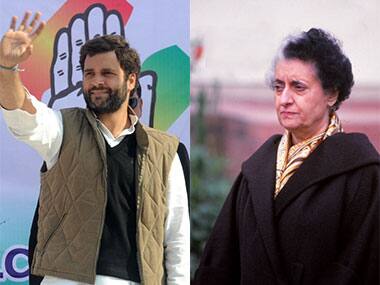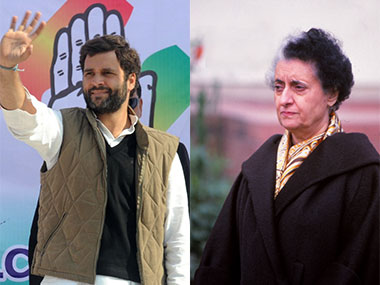By Vivek Katju The Supreme Court held in the Lily Thomas case that Indian legislators would lose their seats upon conviction for criminal offences listed in the relevant sections of the Representation of People’s Act, 1951. The high political drama in September and early this month on the draft Ordinance to bypass the Supreme Court judgment including the President’s obvious reluctance to sign the Ordinance, Mr Rahul Gandhi’s intervention and the government’s consequent withdrawal of the Ordinance as well as the decision to withdraw the Bill in Parliament transfixed the nation. It demonstrated that the political class has now to bow before people’s power and the reach of the media and undo a measure that was perceived to be designed only to protect the criminal in politics. [caption id=“attachment_118455” align=“alignleft” width=“380”]
 The same style of decision-making persists. Getty Images.[/caption] For this writer, it evoked memories of that warm morning of June 12, 1975 when Justice Jagmohan Lal Sinha of the Allahabad High Court set aside Mrs Indira Gandhi’s election to Lok Sabha. Indeed, this writer was present in the courtroom and remembers well the moment when Justice Sinha read out the operative portion of the verdict which held a charismatic and powerful Prime Minister guilty of electoral malpractice and debarred her from contesting any election or holding any elected office for six years. The political storm that broke after the judgment led to Mrs Gandhi imposing the Emergency, a chapter of India’s history that is almost forgotten. Her apologists attribute the imposition of the Emergency to a desire to ensure the stability of the country. It was in fact an attempt to hold on to office and Membership of Parliament. This is most clearly seen in the political brazenness and audacity of the insertion of Article 329-A in the Constitution through an amendment within two months of the Emergency. Article 329-A put the Prime Minister and the Speaker in a separate category from all other MPs putting their elections beyond the process of ordinary law. The Amendment sought to negate the verdict against Mrs Gandhi not through a judicial process but through a Constitutional Amendment. As Chief Justice A N Ray who led a five judge bench which heard Mrs Gandhi’s appeal noted, “Clause 4 of Article329-A has done four things. First, it has wiped not merely the judgment but also the election petition and the law relating thereto. Secondly, it has deprived the right to raise a dispute about the validity of the election by not having provided another forum. Third, there is no judgment to deal with and no right or dispute to adjudicate upon. Fourth, the constituent power of its own legislative judgment has validated the election”. The bench did find a way to go into the substance of the Allahabad High Court judgment and overturned it on merits but it did not strike down the Amendment. It was the Janata Party government which came in after the Emergency which moved Parliament successfully to repeal the Amendment. It is interesting that the government went back to the Indira Gandhi election case in preparing the draft Ordinance. How? Immediately after the Allahabad High Court verdict Mrs Gandhi approached the Supreme Court for an unconditional stay of the judgment. The conditions imposed by Justice V R Krishna Iyer were relied upon in the Ordinance in working out the limitations to be imposed on MPs after a criminal conviction. However it is pertinent that Justice Krishna Iyer left Mrs Gandhi completely free to perform her functions as Prime Minister during the pendency of the appeal in the Supreme Court. The Ordinance was silent on the issue of legislators holding ministerial office or heading commissions. These matters may be beyond the scope of the RPA but they have to be addressed all the same because there has to be a legal bar on the occupation of these high offices by those convicted of criminal offences even by a trial court. It cannot be left to political conventions alone. The responses of the grandmother and the grandson were drastically different in substance but somewhat similar in style. The former showed an imperious disregard for democratic principles. Notwithstanding the arrogant and brusque manner in which the latter intervened in the debate on the Ordinance he had no option but to bow to the public sentiment. In 1975 members of the Congress party submitted to Mrs Indira Gandhi and Sanjay Gandhi’s authoritarianism without a whimper; only after the declaration of elections did Babu Jagjivan Ram and Hemvati Nandan Bahuguna revolt and leave the party. In 2013 the Congress party despite all the embarrassment of a volte face fell in line without a murmur to Mr Rahul Gandhi’s will. India has been vastly transformed in the almost four decades that lie between the two decisions. The crucial difference between now and the 1970s, which the political class realised only gradually in the course of the weeks that passed since the Lily Thomas verdict in July lies in the growing assertiveness of the people. The Indian judiciary is now in activist mode and no longer shy of looking beyond the confines of the court. The media is a powerful social and political force and gives voice to the people. In the ultimate analysis however it is Justice Y V Chandrachud’s assertion in his Supreme Court judgment in the Indira Gandhi election case that is the breakwater against gross political impropriety whether it was in 1975 or attempted in 2013. Justice Chandrachud remarked, “It is the common man’s sense of justice which sustains democracies….” This “sense of justice” is innate. It is beyond the niceties and complexities of the law. It seldom finds expression but it is ever present in public consciousness and when the cup gets full the people find ways to deliver justice even if they have to bide their time. They did so in 1977 against arrogant authoritarianism and now in 2013 they sent a clear warning to the political class that their patience with the criminal in politics has worn thin. (Vivek Katju is a retired diplomat, who served as India’s ambassador to Afghanistan.)
The same style of decision-making persists. Getty Images.[/caption] For this writer, it evoked memories of that warm morning of June 12, 1975 when Justice Jagmohan Lal Sinha of the Allahabad High Court set aside Mrs Indira Gandhi’s election to Lok Sabha. Indeed, this writer was present in the courtroom and remembers well the moment when Justice Sinha read out the operative portion of the verdict which held a charismatic and powerful Prime Minister guilty of electoral malpractice and debarred her from contesting any election or holding any elected office for six years. The political storm that broke after the judgment led to Mrs Gandhi imposing the Emergency, a chapter of India’s history that is almost forgotten. Her apologists attribute the imposition of the Emergency to a desire to ensure the stability of the country. It was in fact an attempt to hold on to office and Membership of Parliament. This is most clearly seen in the political brazenness and audacity of the insertion of Article 329-A in the Constitution through an amendment within two months of the Emergency. Article 329-A put the Prime Minister and the Speaker in a separate category from all other MPs putting their elections beyond the process of ordinary law. The Amendment sought to negate the verdict against Mrs Gandhi not through a judicial process but through a Constitutional Amendment. As Chief Justice A N Ray who led a five judge bench which heard Mrs Gandhi’s appeal noted, “Clause 4 of Article329-A has done four things. First, it has wiped not merely the judgment but also the election petition and the law relating thereto. Secondly, it has deprived the right to raise a dispute about the validity of the election by not having provided another forum. Third, there is no judgment to deal with and no right or dispute to adjudicate upon. Fourth, the constituent power of its own legislative judgment has validated the election”. The bench did find a way to go into the substance of the Allahabad High Court judgment and overturned it on merits but it did not strike down the Amendment. It was the Janata Party government which came in after the Emergency which moved Parliament successfully to repeal the Amendment. It is interesting that the government went back to the Indira Gandhi election case in preparing the draft Ordinance. How? Immediately after the Allahabad High Court verdict Mrs Gandhi approached the Supreme Court for an unconditional stay of the judgment. The conditions imposed by Justice V R Krishna Iyer were relied upon in the Ordinance in working out the limitations to be imposed on MPs after a criminal conviction. However it is pertinent that Justice Krishna Iyer left Mrs Gandhi completely free to perform her functions as Prime Minister during the pendency of the appeal in the Supreme Court. The Ordinance was silent on the issue of legislators holding ministerial office or heading commissions. These matters may be beyond the scope of the RPA but they have to be addressed all the same because there has to be a legal bar on the occupation of these high offices by those convicted of criminal offences even by a trial court. It cannot be left to political conventions alone. The responses of the grandmother and the grandson were drastically different in substance but somewhat similar in style. The former showed an imperious disregard for democratic principles. Notwithstanding the arrogant and brusque manner in which the latter intervened in the debate on the Ordinance he had no option but to bow to the public sentiment. In 1975 members of the Congress party submitted to Mrs Indira Gandhi and Sanjay Gandhi’s authoritarianism without a whimper; only after the declaration of elections did Babu Jagjivan Ram and Hemvati Nandan Bahuguna revolt and leave the party. In 2013 the Congress party despite all the embarrassment of a volte face fell in line without a murmur to Mr Rahul Gandhi’s will. India has been vastly transformed in the almost four decades that lie between the two decisions. The crucial difference between now and the 1970s, which the political class realised only gradually in the course of the weeks that passed since the Lily Thomas verdict in July lies in the growing assertiveness of the people. The Indian judiciary is now in activist mode and no longer shy of looking beyond the confines of the court. The media is a powerful social and political force and gives voice to the people. In the ultimate analysis however it is Justice Y V Chandrachud’s assertion in his Supreme Court judgment in the Indira Gandhi election case that is the breakwater against gross political impropriety whether it was in 1975 or attempted in 2013. Justice Chandrachud remarked, “It is the common man’s sense of justice which sustains democracies….” This “sense of justice” is innate. It is beyond the niceties and complexities of the law. It seldom finds expression but it is ever present in public consciousness and when the cup gets full the people find ways to deliver justice even if they have to bide their time. They did so in 1977 against arrogant authoritarianism and now in 2013 they sent a clear warning to the political class that their patience with the criminal in politics has worn thin. (Vivek Katju is a retired diplomat, who served as India’s ambassador to Afghanistan.)
Rahul and Indira: Both authoritarian, both given a warning by India
FP Archives
• October 21, 2013, 15:50:02 IST
Whether Indira’s attempt to hold on to office through Article 329-A or the Congress party’s effort to protect criminals in politics, people’s “sense of justice” has prevailed.
Advertisement
)